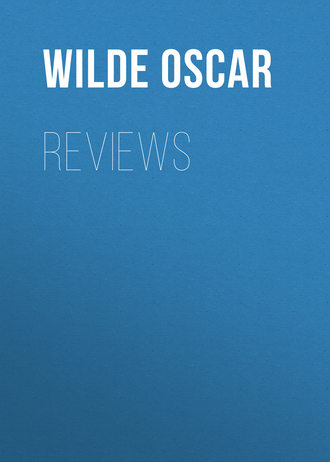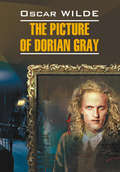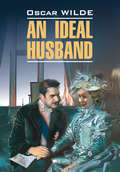
Оскар Уайльд
Reviews
LITERARY AND OTHER NOTES – V
(Woman’s World, March 1888.)
The Princess Emily Ruete of Oman and Zanzibar, whose efforts to introduce women doctors into the East are so well known, has just published a most interesting account of her life, under the title of Memoirs of an Arabian Princess. The Princess is the daughter of the celebrated Sejid Saîd, Imam of Mesket and Sultan of Zanzibar, and her long residence in Germany has given her the opportunity of comparing Eastern with Western civilisation. She writes in a very simple and unaffected manner; and though she has many grievances against her brother, the present Sultan (who seems never to have forgiven her for her conversion to Christianity and her marriage with a German subject), she has too much tact, esprit, and good humour to trouble her readers with any dreary record of family quarrels and domestic differences. Her book throws a great deal of light on the question of the position of women in the East, and shows that much of what has been written on this subject is quite inaccurate. One of the most curious passages is that in which the Princess gives an account of her mother:
My mother was a Circassian by birth, who in early youth had been torn away from her home. Her father had been a farmer, and she had always lived peacefully with her parents and her little brother and sister. War broke out suddenly, and the country was overrun by marauding bands. On their approach, the family fled into an underground place, as my mother called it – she probably meant a cellar, which is not known in Zanzibar. Their place of refuge was, however, invaded by a merciless horde, the parents were slain, and the children carried off by three mounted Arnauts.
She came into my father’s possession when quite a child, probably at the tender age of seven or eight years, as she cast her first tooth in our house. She was at once adopted as playmate by two of my sisters, her own age, with whom she was educated and brought up. Together with them she learnt to read, which raised her a good deal above her equals, who, as a rule, became members of our family at the age of sixteen or eighteen years, or older still, when they had outgrown whatever taste they might once have had for schooling. She could scarcely be called pretty; but she was tall and shapely, had black eyes, and hair down to her knees. Of a very gentle disposition, her greatest pleasure consisted in assisting other people, in looking after and nursing any sick person in the house; and I well remember her going about with her books from one patient to another, reading prayers to them.
She was in great favour with my father, who never refused her anything, though she interceded mostly for others; and when she came to see him, he always rose to meet her half-way – a distinction he conferred but very rarely. She was as kind and pious as she was modest, and in all her dealings frank and open. She had another daughter besides myself, who had died quite young. Her mental powers were not great, but she was very clever at needlework. She had always been a tender and loving mother to me, but this did not hinder her from punishing me severely when she deemed it necessary.
She had many friends at Bet-il-Mtoni, which is rarely to be met with in an Arab harem. She had the most unshaken and firmest trust in God. When I was about five years old, I remember a fire breaking out in the stables close by, one night while my father was at his city residence. A false alarm spread over the house that we, too, were in imminent danger; upon which the good woman hastened to take me on her arm, and her big kurân (we pronounce the word thus) on the other, and hurried into the open air. On the rest of her possessions she set no value in this hour of danger.
Here is a description of Schesade, the Sultan’s second legitimate wife:
She was a Persian Princess of entrancing beauty, and of inordinate extravagance. Her little retinue was composed of one hundred and fifty cavaliers, all Persians, who lived on the ground floor; with them she hunted and rode in the broad day – rather contrary to Arab notions. The Persian women are subjected to quite a Spartan training in bodily exercise; they enjoy great liberty, much more so than Arab women, but they are also more rude in mind and action.
Schesade is said to have carried on her extravagant style of life beyond bounds; her dresses, cut always after the Persian fashion, were literally covered with embroideries of pearls. A great many of these were picked up nearly every morning by the servants in her rooms, where she had dropped them from her garments, but the Princess would never take any of these precious jewels back again. She did not only drain my father’s exchequer most wantonly, but violated many of our sacred laws; in fact, she had only married him for his high station and wealth, and had loved some one else all the time. Such a state of things could, of course, only end in a divorce; fortunately Schesade had no children of her own. There is a rumour still current among us that beautiful Schesade was observed, some years after this event, when my father carried on war in Persia, and had the good fortune of taking the fortress of Bender Abbâs on the Persian Gulf, heading her troops, and taking aim at the members of our family herself.
Another of the remarkable women mentioned by the Princess was her stepmother, Azze-bint-Zef, who seems to have completely ruled the Sultan, and to have settled all questions of home and foreign policy; while her great-aunt, the Princess Asche, was regent of the empire during the Sultan’s minority, and was the heroine of the siege of Mesket. Of her the Princess gives the following account:
Dressed in man’s clothes, she inspected the outposts herself at night, she watched and encouraged the soldiers in all exposed places, and was saved several times only by the speed of her horse in unforeseen attacks. One night she rode out, oppressed with care, having just received information that the enemy was about to attempt an entrance into the city by means of bribery that night, and with intent to massacre all; and now she went to convince herself of the loyalty of her troops. Very cautiously she rode up to a guard, requesting to speak to the ‘Akîd’ (the officer in charge), and did all in her power to seduce him from his duty by great offers of reward on the part of the besiegers. The indignation of the brave man, however, completely allayed her fears as to the fidelity of the troops, but the experiment nearly cost her her own life. The soldiers were about to massacre the supposed spy on the spot, and it required all her presence of mind to make good her escape.
The situation grew, however, to be very critical at Mesket. Famine at last broke out, and the people were well-nigh distracted, as no assistance or relief could be expected from without. It was therefore decided to attempt a last sortie in order to die at least with glory. There was just sufficient powder left for one more attack, but there was no more lead for either guns or muskets. In this emergency the regent ordered iron nails and pebbles to be used in place of balls. The guns were loaded with all the old iron and brass that could be collected, and she opened her treasury to have bullets made out of her own silver dollars. Every nerve was strained, and the sally succeeded beyond all hope. The enemy was completely taken by surprise and fled in all directions, leaving more than half their men dead and wounded on the field. Mesket was saved, and, delivered out of her deep distress, the brave woman knelt down on the battlefield and thanked God in fervent prayer.
From that time her Government was a peaceful one, and she ruled so wisely that she was able to transfer to her nephew, my father, an empire so unimpaired as to place him in a position to extend the empire by the conquest of Zanzibar. It is to my great-aunt, therefore, that we owe, and not to an inconsiderable degree, the acquisition of this second empire.
She, too, was an Eastern woman!
All through her book the Princess protests against the idea that Oriental women are degraded or oppressed, and in the following passage she points out how difficult it is for foreigners to get any real information on the subject:
The education of the children is left entirely to the mother, whether she be legitimate wife or purchased slave, and it constitutes her chief happiness. Some fashionable mothers in Europe shift this duty on to the nurse, and, by-and-by, on the governess, and are quite satisfied with looking up their children, or receiving their visits, once a day. In France the child is sent to be nursed in the country, and left to the care of strangers. An Arab mother, on the other hand, looks continually after her children. She watches and nurses them with the greatest affection, and never leaves them as long as they may stand in need of her motherly care, for which she is rewarded by the fondest filial love.
If foreigners had more frequent opportunities to observe the cheerfulness, the exuberance of spirits even, of Eastern women, they would soon and more easily be convinced of the untruth of all those stories afloat about the degraded, oppressed, and listless state of their life. It is impossible to gain a true insight into the actual domesticity in a few moments’ visit; and the conversation carried on, on those formal occasions, hardly deserves that name; there is barely more than the exchange of a few commonplace remarks – and it is questionable if even these have been correctly interpreted.
Notwithstanding his innate hospitality, the Arab has the greatest possible objection to having his home pried into by those of another land and creed. Whenever, therefore, a European lady called on us, the enormous circumference of her hoops (which were the fashion then, and took up the entire width of the stairs) was the first thing to strike us dumb with wonder; after which, the very meagre conversation generally confined itself on both sides to the mysteries of different costumes; and the lady retired as wise as she was when she came, after having been sprinkled over with attar of roses, and being the richer for some parting presents. It is true she had entered a harem; she had seen the much-pitied Oriental ladies (though only through their veils); she had with her own eyes seen our dresses, our jewellery, the nimbleness with which we sat down on the floor – and that was all. She could not boast of having seen more than any other foreign lady who had called before her. She is conducted upstairs and downstairs, and is watched all the time. Rarely she sees more than the reception-room, and more rarely still can she guess or find out who the veiled lady is with whom she conversed. In short, she has had no opportunity whatsoever of learning anything of domestic life, or the position of Eastern women.
No one who is interested in the social position of women in the East should fail to read these pleasantly-written memoirs. The Princess is herself a woman of high culture, and the story of her life is as instructive as history and as fascinating as fiction.
* * * * *
Mrs. Oliphant’s Makers of Venice is an admirable literary pendant to the same writer’s charming book on Florence, though there is a wide difference between the beautiful Tuscan city and the sea-city of the Adriatic. Florence, as Mrs. Oliphant points out, is a city full of memories of the great figures of the past. The traveller cannot pass along her streets without treading in the very traces of Dante, without stepping on soil made memorable by footprints never to be effaced. The greatness of the surroundings, the palaces, churches, and frowning mediæval castles in the midst of the city, are all thrown into the background by the greatness, the individuality, the living power and vigour of the men who are their originators, and at the same time their inspiring soul. But when we turn to Venice the effect is very different. We do not think of the makers of that marvellous city, but rather of what they made. The idealised image of Venice herself meets us everywhere. The mother is not overshadowed by the too great glory of any of her sons. In her records the city is everything – the republic, the worshipped ideal of a community in which every man for the common glory seems to have been willing to sink his own. We know that Dante stood within the red walls of the arsenal, and saw the galleys making and mending, and the pitch flaming up to heaven; Petrarch came to visit the great Mistress of the Sea, taking refuge there, ‘in this city, true home of the human race,’ from trouble, war and pestilence outside; and Byron, with his facile enthusiasms and fervent eloquence, made his home for a time in one of the stately, decaying palaces; but with these exceptions no great poet has ever associated himself with the life of Venice. She had architects, sculptors and painters, but no singer of her own. The arts through which she gave her message to the world were visible and imitative. Mrs. Oliphant, in her bright, picturesque style, tells the story of Venice pleasantly and well. Her account of the two Bellinis is especially charming; and the chapters on Titian and Tintoret are admirably written. She concludes her interesting and useful history with the following words, which are well worthy of quotation, though I must confess that the ‘alien modernisms’ trouble me not a little:
The critics of recent days have had much to say as to the deterioration of Venice in her new activity, and the introduction of alien modernisms, in the shape of steamboats and other new industrial agents, into her canals and lagoons. But in this adoption of every new development of power, Venice is only proving herself the most faithful representative of the vigorous republic of old. Whatever prejudice or angry love may say, we cannot doubt that the Michiels, the Dandolos, the Foscari, the great rulers who formed Venice, had steamboats existed in their day, serving their purpose better than their barges and peati, would have adopted them without hesitation, without a thought of what any critics might say. The wonderful new impulse which has made Italy a great power has justly put strength and life before those old traditions of beauty, which made her not only the ‘woman country’ of Europe, but a sort of Odalisque trading upon her charms, rather than the nursing mother of a noble and independent nation. That in her recoil from that somewhat degrading position, she may here and there have proved too regardless of the claims of antiquity, we need not attempt to deny; the new spring of life in her is too genuine and great to keep her entirely free from this evident danger. But it is strange that any one who loves Italy, and sincerely rejoices in her amazing resurrection, should fail to recognise how venial is this fault.
Miss Mabel Robinson’s last novel, The Plan of Campaign, is a very powerful study of modern political life. As a concession to humanity, each of the politicians is made to fall in love, and the charm of their various romances fully atones for the soundness of the author’s theory of rent. Miss Robinson dissects, describes, and discourses with keen scientific insight and minute observation. Her style, though somewhat lacking in grace, is, at its best, simple and strong. Richard Talbot and Elinor Fetherston are admirably conceived and admirably drawn, and the whole account of the murder of Lord Roeglass is most dramatic.
A Year in Eden, by Harriet Waters Preston, is a chronicle of New England life, and is full of the elaborate subtlety of the American school of fiction. The Eden in question is the little village of Pierpont, and the Eve of this provincial paradise is a beautiful girl called Monza Middleton, a fascinating, fearless creature, who brings ruin and misery on all who love her. Miss Preston writes an admirable prose style, and the minor characters in the book are wonderfully lifelike and true.
The Englishwoman’s Year-Book contains a really extraordinary amount of useful information on every subject connected with woman’s work. In the census taken in 1831 (six years before the Queen ascended the Throne), no occupation whatever was specified as appertaining to women, except that of domestic service; but in the census of 1881, the number of occupations mentioned as followed by women is upwards of three hundred and thirty. The most popular occupations seem to be those of domestic service, school teaching, and dressmaking; the lowest numbers on the list are those of bankers, gardeners, and persons engaged in scientific pursuits. Besides these, the Year-Book makes mention of stockbroking and conveyancing as professions that women are beginning to adopt. The historical account of the literary work done by Englishwomen in this century, as given in the Year-Book, is curiously inadequate, and the list of women’s magazines is not complete, but in all other respects the publication seems a most useful and excellent one.
* * * * *
Wordsworth, in one of his interesting letters to Lady Beaumont, says that it is ‘an awful truth that there neither is nor can be any genuine enjoyment of poetry among nineteen out of twenty of those persons who live or wish to live in the broad light of the world – among those who either are, or are striving to make themselves, people of consideration in society,’ adding that the mission of poetry is ‘to console the afflicted; to add sunshine to daylight by making the happy happier; to teach the young and the gracious of every age to see, to think, and feel, and, therefore, to become more actively and securely virtuous.’ I am, however, rather disposed to think that the age in which we live is one that has a very genuine enjoyment of poetry, though we may no longer agree with Wordsworth’s ideas on the subject of the poet’s proper mission; and it is interesting to note that this enjoyment manifests itself by creation even more than by criticism. To realise the popularity of the great poets, one should turn to the minor poets and see whom they follow, what master they select, whose music they echo. At present, there seems to be a reaction in favour of Lord Tennyson, if we are to judge by Rachel and Other Poems, which is a rather remarkable little volume in its way. The poem that gives its title to the book is full of strong lines and good images; and, in spite of its Tennysonian echoes, there is something attractive in such verses as the following:
Day by day along the Orient faintly glows the tender dawn,
Day by day the pearly dewdrops tremble on the upland lawn:
Day by day the star of morning pales before the coming ray,
And the first faint streak of radiance brightens to the perfect day.
Day by day the rosebud gathers to itself, from earth and sky,
Fragrant stores and ampler beauty, lovelier form and deeper dye:
Day by day a richer crimson mantles in its glowing breast —
Every golden hour conferring some sweet grace that crowns the rest.
And thou canst not tell the moment when the day ascends her throne,
When the morning star hath vanished, and the rose is fully blown.
So each day fulfils its purpose, calm, unresting, strong, and sure,
Moving onward to completion, doth the work of God endure.
How unlike man’s toil and hurry! how unlike the noise, the strife,
All the pain of incompleteness, all the weariness of life!
Ye look upward and take courage. He who leads the golden hours,
Feeds the birds, and clothes the lily, made these human hearts of ours:
Knows their need, and will supply it, manna falling day by day,
Bread from heaven, and food of angels, all along the desert way.
The Secretary of the International Technical College at Bedford has issued a most interesting prospectus of the aims and objects of the Institution. The College seems to be intended chiefly for ladies who have completed their ordinary course of English studies, and it will be divided into two departments, Educational and Industrial. In the latter, classes will be held for various decorative and technical arts, and for wood-carving, etching, and photography, as well as sick-nursing, dressmaking, cookery, physiology, poultry-rearing, and the cultivation of flowers. The curriculum certainly embraces a wonderful amount of subjects, and I have no doubt that the College will supply a real want.
* * * * *
The Ladies’ Employment Society has been so successful that it has moved to new premises in Park Street, Grosvenor Square, where there are some very pretty and useful things for sale. The children’s smocks are quite charming, and seem very inexpensive. The subscription to the Society is one guinea a year, and a commission of five per cent. is charged on each thing sold.
* * * * *
Miss May Morris, whose exquisite needle-work is well known, has just completed a pair of curtains for a house in Boston. They are amongst the most perfect specimens of modern embroidery that I have seen, and are from Miss Morris’s own design. I am glad to hear that Miss Morris has determined to give lessons in embroidery. She has a thorough knowledge of the art, her sense of beauty is as rare as it is refined, and her power of design is quite remarkable.
Mrs. Jopling’s life-classes for ladies have been such a success that a similar class has been started in Chelsea by Mr. Clegg Wilkinson at the Carlyle Studios, King’s Road. Mr. Wilkinson (who is a very brilliant young painter) is strongly of opinion that life should be studied from life itself, and not from that abstract presentation of life which we find in Greek marbles – a position which I have always held very strongly myself.
(1) Memoirs of an Arabian Princess. By the Princess Emily Ruete of Oman and Zanzibar. (Ward and Downey.)
(2) Makers of Venice. By Mrs. Oliphant. (Macmillan and Co.)
(3) The Plan of Campaign. By Mabel Robinson. (Vizetelly and Co.)
(4) A Year in Eden. By Harriet Waters Preston. (Fisher Unwin.)
(5) The Englishwoman’s Year-Book, 1888. (Hatchards.)
(6) Rachel and Other Poems. (Cornish Brothers.)






